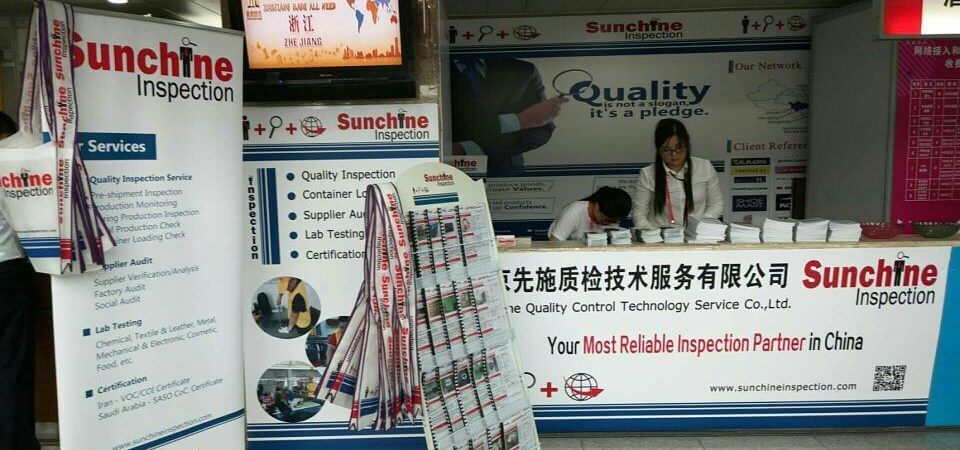We are Sunchine Inspection
Founded in 2005, Sunchine Inspection is one branch of Sunchine International; a Hong Kong based multinational company specializing in export-import consulting and quality management. Today, with two offices in China mainland and one office in Europe, Sunchine Inspection has become one of the best third party inspection companies in China, serving over 1,500 regular clients in various fields from all the Continents in the world.


Today, the inspection team of Sunchine Inspection is composed by around 120 fully qualified and accredited inspectors, more than 50 experienced account managers, and one very dynamic managing and marketing team. Our network is already present in more than 50 mains cities in China, which covers almost every important industrial region in China.
To delivery optimum inspections results, Sunchine Inspection arranges the inspector according to your product classification. All our inspectors are very knowledgeable and experts in their field.
To delivery optimum inspections results, Sunchine Inspection arranges the inspector according to your product classification. All our inspectors are very knowledgeable and experts in their field.
We don’t produce goods, but we create Values;
We don’t sell products, but we build up Confidence;
We don’t export cargos, but we are the symbol of Insurance;
The clients choose us, because we know better their Needs.
China Office
Room 2203, 22/F, Building 03, Zhongtai
International Plaza, 311, Middle Jiangdong
Road, 210019 - Nanjing - R.P.China
Tel: 0086-25-6809 3658
Fax: 0086-25- 8609 3678
E-mail: francois.shi@sunchineconsulting.com
Contact: Mr. Francois SHI
Managing Director in China Office
Mob: 0086-18951633559
Website: http://saiinspection.com.cn
Room 2203, 22/F, Building 03, Zhongtai
International Plaza, 311, Middle Jiangdong
Road, 210019 - Nanjing - R.P.China
Tel: 0086-25-6809 3658
Fax: 0086-25- 8609 3678
E-mail: francois.shi@sunchineconsulting.com
Contact: Mr. Francois SHI
Managing Director in China Office
Mob: 0086-18951633559
Website: http://saiinspection.com.cn
- - - - - - - - - - - - - - - - - - - - - - - - - - -
- - - - - - - - - - - - - - - - - - - -
 - - - - - - - - - - - - - - - - - - - -
- - - - - - - - - - - - - - - - - - - -Investing in an Injection Mold: What Is Best Practice in China?
BY RENAUD ANJORAN
Many importers are puzzled. They ask quotations for a plastic part, and Chinese suppliers quote wildly different amounts for the injection mold.
One reason, obviously, is the nature of the mold:
- Is it in hard metal (e.g. H13 steel), ready to make hundreds of thousands of pieces? Or in soft metal (e.g. aluminium), for making a few prototypes only?
- Is it a single cavity mold (requiring more machine time and more labor)? Or multi cavity (more expensive, but more efficient for large production runs)?
- There are other considerations, of course, but these are just 2 examples of things to specify. See a list of design mistakes and a list of common defects to have an idea of what can go wrong…
And another reason is the business approach of the supplier. What game do they want to play? I listed the main 3 options:
- You let the supplier make the mold at their cost, the mold is theirs. They include it in the price of the finished product, but you don’t know by how much. This is more expensive in the long run, and you have no control over the supplier (they own the molds you need for your production).
- The supplier partially subsidizes the mold, the mold is theirs, and again they plan to amortize over time in the price of the plastic parts. This is also expensive in the long run, and you also have no control over the supplier.
- You pay the full price of the mold, you have a contract (enforceable in China) that says all the tooling is yours and you can get it back, and then you can use the forces of competition to keep the injection molding job affordable over the long term. This is also the safest option when it comes to IP protection.
If you plan to make small production runs and you don’t mind if your competitors get access to the same mold, then all the best if a Chinese manufacturer is ready to subsidize it!
In, on the other hand, you plan to make relatively large series of that plastic part, and if you want to keep control over who uses the tooling, go for option 3.
There are a few things most buyers don’t think of.
First, you need to have an agreement with the supplier that they maintain the mold. They should not store it in a dusty or humid place. They should re-make it if they damage it. And so forth.
Second, what happens when the tooling gets to the end of its useful life?
There are two options:
- Let’s say your order volume is very high. Supplier might accept to make new tooling for free in order to continue production, without raising the unit cost of the plastic parts.
- Supplier makes the new tooling in order to continue production, and the full price is paid by the customer (same as option 3 as outlined above).
Overall, in the long run, investing to own and control the tooling is usually the cheapest proposition. One notable exception is the prototyping stage, where having a supplier make cheap tooling on their own can make good sense.
Article Source: qualityinspection

没有评论:
发表评论